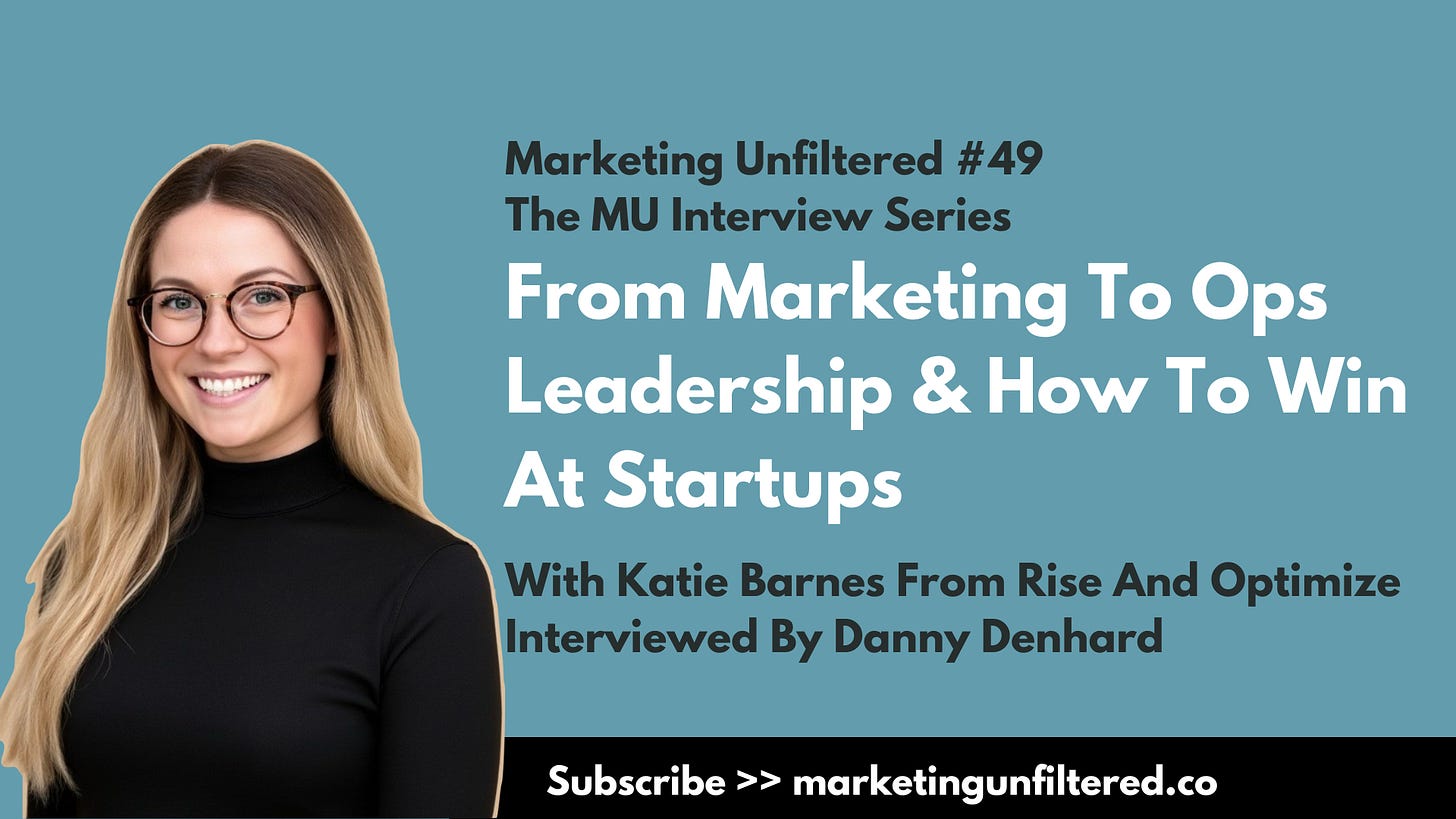From Marketing To Ops Leadership
Marketing Unfiltered #49 - Marketing → Ops Leadership & How To Lead Inside Startups
Good Morning Leaders and welcome back.
Thanks for the feedback on last week’s Marketing In 2030 report.
This week I spoke to Katie Barnes, who’s a fCOO with a background in Marketing and moving into the C-Suite. I’ve spoken to a number of Marketing leaders over the last six months who are considering moving roles or looking to move across the C-Suite, so Katie was a great fit here.
Funny story, Kate and I actually over Substack and a debate over if Slack is a good or bad feature within the workplace. Katie is creating great newsletters on ops and has some brilliant series on Substack that will help many in early stage businesses and startups succeed where so many are failing.
So, this week I have another Marketing Unfiltered interview for you to enjoy.
If you are short on time please read my interview breakdown by scrolling below.
Watch ▶️
» Connect With Katie on her site, LinkedIn or subscribe to her newsletter over on Substack
Listen 🎧
Or listen as a podcast below
The Exec Summary
In my interview with Katie, we discover how a former Marketer became a fractional COO and Head of Operations. We talked about Katie’s 14 years of experience and her journey into fractional leadership.
Katie and I discussed the common challenges that early-stage startups face, such as founder bottlenecks, and how her fractional role provides a solution.
A lot of our chat revolved around the balance between human empathy and AI in business processes. Something we will all need to remember in the coming months.
I found it interesting how Katie views AI as a sparring partner, something to aid strategic thinking without replacing the human element.
We also talked about the importance of effective internal communication and meeting etiquette, which are often overlooked and often a weak spot that Marketing leaders bring up in coaching.
Katie also shared some practical tips, like her “must do, should do, and let it go” list routine, which I really liked. I found the discussion of how marketing leaders can be more operationally savvy particularly insightful and I know many of you will be appreciate her candor.
The Key 10 Points Discussed
The Fractional COO Role: Katie Barnes is a fractional COO and Head of Operations with over 14 years of experience across various industries, including SaaS, health, and legal tech. She works with early-stage companies (bootstrapped to Series A) that have similar operational issues despite being in different sectors. Her role is to act as “the glue” that aligns sales, customer success, and marketing teams.
Addressing Founder Bottlenecks: Katie highlighted that early-stage companies often can’t afford to hire for every leadership role, which creates a founder bottleneck. Her fractional work allows these companies to access her extensive experience without a full-time financial commitment that would “ruin their runway”.
AI’s Role in Operations: We discussed the rise of AI and how some founders mistakenly think it can handle everything. Katie stressed that while AI is a great tool for generating processes, it’s crucial to involve the human teams that will be using them. A process created solely by AI can lead to pushback and a poor flow.
The Importance of Empathy: Katie is a firm believer in a “people first, AI-powered” approach. She feels that empathy and emotional intelligence are often lacking in companies and are crucial for successful operations. She pointed out that anything that requires human empathy should not be automated.
Effective Internal Communication: We both agreed that internal communication often makes or breaks the implementation of new tactics. I found it interesting that Katie still believes Slack is the best tool for this, but only when used correctly with proper channel structures and accountability loops.
Meeting Etiquette and Efficiency: We both saw that many businesses are terrible at meeting etiquette. Katie recommended having a clear agenda sent in advance, with non-negotiable points like reviewing last week’s actions. I shared my tip of assigning a specific role (e.g., decision-maker, devil’s advocate) to each attendee to clarify their purpose.
Common Business Failures: Katie pointed out several areas where companies are getting worse, including:
Poor Onboarding: Both for employees and new clients, which can lead to churn.
Lack of Data Visibility: Companies often don’t have a single source of truth for their data, making it difficult to track metrics.
Unstructured Operating Cadence: This includes meetings that lack a clear purpose and end with “to be determined”.
The Value of Documentation: Katie underscored the importance of documenting processes, even if it’s as simple as a Loom video. This helps teams stay aligned and provides a home base to refer back to for messaging and experiments.
Katie’s Sunday Routine: I really enjoyed learning about Katie’s personal Sunday routine (via Substack notes), where she uses a three-column note system: Must Do, Should Do, and Let It Go. This framework helps her prioritize tasks for the week, including business and personal chores, and, as she said, helps her “let go of some things”
The Importance of Pushback: Katie and I discussed the challenges of advising founders. She’s very upfront that she’s “no BS” and isn’t afraid to push back on their ideas. This directness is part of why she gets hired, as founders want a sparring partner, not a “yes man”.
Here are some of the tools Katie and I recommend
The Top 3 Quotes From Katie
1/ “I’m really like a lot of times considered that glue. So a really good blend of that like operational and marketing background and very classic generalist for sure”.
2/ “I think that a lot of times then the rest of the team sort of gets left out of that. And so if you try to launch a process that was only created with AI, a lot of times the team’s gonna either push back or it’s just not gonna flow naturally”.
3/ On AI - “I mean, I found it so interesting. I definitely use it as like a sparring partner and I like to use it to kind of help me go back and forth on strategic thinking and setting up process, but I still want that human voice in there always”.
The Core Takeaway
The key takeaway for me from my conversation with Katie is that even with the rise of AI and new technologies, the core of her success and in generally in business lies in human-centric operations (this was the Brené Brown podcast I referenced).
We have to remember this with the pressures we come under with AI, reducing headcount and doing more with less (budget & people).
Technology like AI can be a powerful tool, but it’s most effective when used to enhance, not replace, human empathy and communication. Companies, especially startups, need to prioritize clear communication, structured meetings, and a strong sense of ownership among employees. Katie’s approach, blending operational expertise with a “people-first” mindset, provides a clear roadmap for businesses looking to build a resilient and effective foundation.
Please do connect with Katie on her channels below
Site & read her great series on leaky buckets
Thanks for reading/watching or listening today and we will see you next week
Danny Denhard




